
Photuris is a genus of fireflies. These are the femme fatale lightning bugs of North America. This common name refers to a behavior of the adult females of these predatory beetles; they engage in aggressive mimicry, imitating the light signals of other firefly species' females to attract mates – but Photuris use it to attract, kill and eat the unsuspecting males of those other species. Their flashing bioluminescent signals seem to have evolved independently and eventually adapted to those of their prey, mainly unrelated Lampyrinae, such as Photinus or Pyractomena.

John Lawrence LeConte MD was an American entomologist, responsible for naming and describing approximately half of the insect taxa known in the United States during his lifetime, including some 5,000 species of beetles. He was recognized as the foremost authority on North American beetles during his career, and has been described as "the father of American beetle study".

Joseph Le Conte was a physician, geologist, professor at the University of California, Berkeley, early California conservationist, and eugenicist.

Agathidium is a genus of beetles in the family Leiodidae.
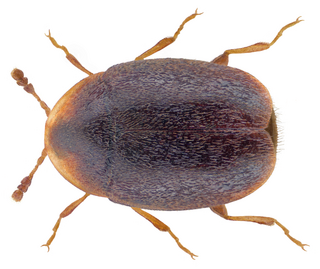
Corylophidae is a family of minute hooded beetles, sometimes called minute fungus beetles, in the superfamily Coccinelloidea. There are about 18 genera and at least 120 described species in Corylophidae. They feed on microfungi such as molds, and are often found associated with bark, as well as in leaf litter and other decaying vegetation. In older literature, the family name was often given as Orthoperidae.

Hygrotus is a genus of beetle in family Dytiscidae. It contains two subgenera and about 70 species, including:

Gyrinus is a genus of small aquatic whirligig beetles in the family Gyrinidae native to the Palearctic, the Near East, the Nearctic, North Africa, Asia and Australia.
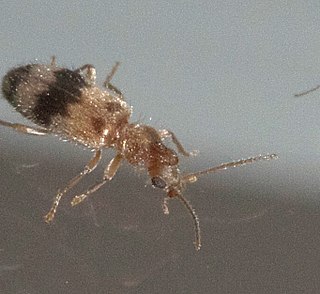
Notoxus is a large genus of beetles that resemble ants. It comprises about 300 species worldwide.
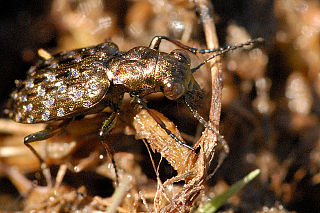
Elaphrus is a genus in the beetle family Carabidae. There are at least 40 described species in Elaphrus.

Hydrochus is the only living genus of beetle in the family Hydrochidae, which belongs to the superfamily Hydrophiloidea, and was formerly treated as a subfamily of Hydrophilidae. Hydrochus includes about 180 species, which are found worldwide. The name "Hydrochus" has also been used for a fly genus in the family Dolichopodidae, but this is a junior subjective synonym of the genus Rhaphium.
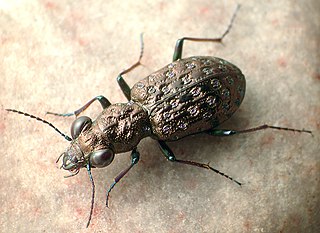
Elaphrus cicatricosus is a species of ground beetle in the subfamily Elaphrinae. It was described by John Lawrence LeConte in 1848.
Elaphrus olivaceus is a species of ground beetle in the subfamily Elaphrinae. It was described by John Lawrence LeConte in 1863.

Pogonocherini is a tribe of longhorn beetles of the subfamily Lamiinae.

Eupogonius is a genus of longhorn beetles of the subfamily Lamiinae. It was described in Journal of the Academy of Natural Sciences of Philadelphia by John Lawrence LeConte in 1852. The species live across Eastern North America, south to Argentina, in forests and woodlots.
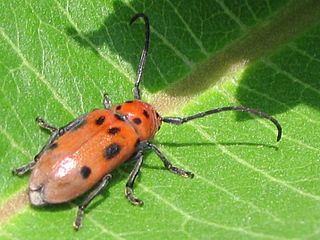
Tetraopes is a genus of longhorn beetles of the subfamily Lamiinae, tribe Tetraopini, containing the following species:

Phaedon is a genus of Chrysomelinae.

Phyllobaenus is a genus of checkered beetles in the family Cleridae. There are at least 60 described species in Phyllobaenus.

Clypastraea is a genus of minute hooded beetles in the family Corylophidae. There are more than 20 described species in Clypastraea.















